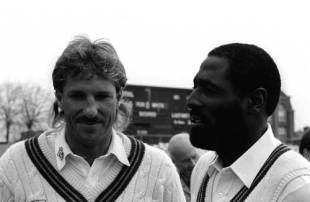
|

Ian Botham didn't actually say 'I could never look Viv Richards in the eye again'
© PA Photos
|
|
Even if the commentators and writers weren't constantly reminding us anyway by squeezing an old response to fit a new situation, we would still have remembered the quote of the 1999 World Cup: Steve Waugh to Herschelle Gibbs after the latter had let him off - "Son, you've just dropped the World Cup" (or variations thereof). In England, reporters were divided into two camps - one thought the whole thing had been made up, and the other held it was just as reported. A smaller group believed that often even players read newspapers only to find out what they said.
Some of cricket's best known quotes were made up by imaginative writers with a deadline to meet. Neville Cardus is the patron saint here, with his insistence that "this is what they ought to have said".
Cardus went so far as to put words in god's mouth. Of Emmott Robinson, he wrote: "I imagine that the Lord one day gathered together a heap of Yorkshire clay and breathed into it and said, 'Emmott Robinson, go and bowl at the pavilion end for Yorkshire.' Years later Robinson remarked, "I reckon Mr Cardus invented me."
Many reporters see it as part of their job to put words into their interviewee's mouth. And if it is a good line, everyone is happy. The player's image as a wise-cracking, one-liner-spewing old pro is enhanced; or if he is one of those shy and retiring types who has shot his bolt after a preliminary "Huh", the reporter can bask in the glow that comes from getting his subject to be articulate. And readers are happy they have a good read.
Occasionally at press conferences someone will lead a captain on to a quote. For example: "Would you agree that batting is a trial by an 11-man jury?" The captain has only to nod his head, and he is credited in the following day's paper as having originated the quote. You see a lot of this at tennis press conferences, with Spanish- or Russian-speaking players being hailed for using the kind of puns and cultural references that might have come from a stand-up comic's writing team.
And yet.
Wouldn't we like to believe that Arthur Wood, the Yorkshire wicketkeeper, actually said to left-arm spinner Hedley Verity (after South Africa's Jock Cameron had hit him for 30 in one over): "Go on Hedley, you've got him in two minds. He doesn't know whether to hit you for four or six."? Or that George Hirst said, "We'll get them in singles" to Wilfred Rhodes (before a last-wicket stand of 15 as England beat Australia at The Oval in 1902), although David Hopps in his A Century of Great Cricket Quotes thinks it is apocryphal?
| |
|
|
|
| |
| Many reporters see it as part of their job to put words into their interviewee's mouth. And if it is a good line, everyone is happy. The player's image as a wise-cracking, one-liner-spewing old pro is enhanced |
| |
When David Gower says, "It's hard work making batting look effortless," it sounds authentic because it sounds like him. Where sporting quotes are concerned, therefore, the traditional test must be stood on its head. You can usually tell what kind of a person someone is from reading what he says. When a sportsman speaks, however, you can only decide if what he says rings true if you know the kind of person he is.
Sometimes a quote sits so well on a person that no one wants to let facts interfere with a good story. A fine example is Ian Botham's much-trumpeted reason for not playing in apartheid South Africa: "I could never look Viv Richards in the eye again." Botham got enormous mileage out of that one, and his image as a boy's own hero was enhanced. As Botham points out in his autobiography, they were stirring words but he never uttered them. "That comment," he writes, "made in good faith and sent to all the newspapers was attributed to me in a statement prepared on my behalf by [the journalist] Reg Hayter, which I never saw." Botham is honest enough to tell us how close he came to actually joining the rebels.
In their collection Classic Sports Quotes, Peter Ball and Phil Shaw identify the Guardian writer Frank Keating as the originator of the sports-quote cottage industry. In the foreword to Hopps's book, Keating explains how, in the 1960s, he began to collect quotes "for fun". Caught by Keating, his own collection, was published in 1978.
There are, however, few Indians quoted in the "Indian" section of A Century of Great Cricket Quotes. I would have loved to see some favourites from my own collection: BS Chandrasekhar's plaintive cry to the umpire after yet another bad umpiring day in New Zealand: "I know he is bowled, but is he out?" Or Eknath Solkar's challenge to Geoff Boycott: "I will out you bloody."
Classic Sports Quotes by Peter Ball and Phil Shaw (Chancellor, 1994)
A Century of Great Cricket Quotes by David Hopps (Robson Books, 1998)
Suresh Menon is a writer based in Bangalore
